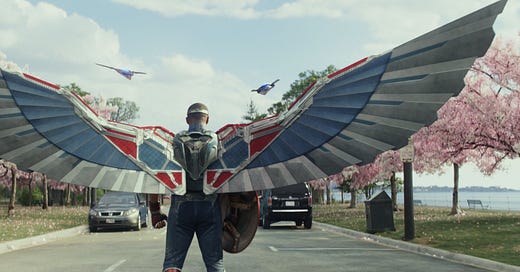Captain America: Brave New World
A superhero thriller that’s politically murky in all the wrong ways.
When I think about pro wrestling, I think of colorful costumes and men who look almost plastic in their muscles and spandex—which is to say, I think about superheroes. Both pro wrestling and superheroes are about having someone to root for, or against—someone to identify with because they see the world in a cartoonish way that still reflects truths about our own. At their best, the characters are compelling, and at their worst, they’re just musclebound bodies. Captain America: Brave New World is a superhero movie that leans generic, sporting the anonymous sheen of Marvel Studios’ house style. The magic of early Marvel movies is long gone—the jokes don’t zing, nor are the characters as colorful or memorable. On a craft level, the movie is competently made; it’s the kind of movie that is designed to make fans of the lore nod in recognition, without ruffling any feathers from the less invested.
Captain America is now Sam Wilson (Anthony Mackie), who does not feel as though he can live up to the standard set by his predecessor, Steve Rogers (played by Chris Evans in the first decade of the Marvel Cinematic Universe). Like Steve, Sam runs covert missions as the superheroic avatar of the United States, a representative of the American government on both official and unofficial business. The country has found itself at a crossroads, searching for direction in a world that has lost most of its best heroes (i.e., the first generation of the MCU). To underscore its fraught position, America has elected a new president, a retired general named Thaddeus “Thunderbolt” Ross (Harrison Ford) who ran on a platform of facing problems “together” but who has a reputation for being hot-tempered and impulsive.
As in some of the previous Captain America movies, Brave New World might be modeled on political thrillers, but Disney isn’t taking any chances. The movie’s own political views are designed to be vague and inoffensive to anyone watching; though the script feints toward being a political thriller, it’s so shy of specifics that anything resembling pointed commentary feels outdated at best and toothless at worst. The movie’s first impulse is to avoid making any political statements, while presenting America as both a world leader and an underdog.
Try as the movie might, its attempt at being apolitical is incompatible with its subject matter. To make a movie about an inherently political figure is to make a political statement, but because Brave New World isn’t interested in the state of the world, it’s better understood as a portrait of how America sees itself, which is where the world leader/underdog self-image comes in. In every physical confrontation, Sam is framed as the smaller combatant, a man who must rely on his agility more than his strength in a fight. The contrast would be more compelling if Sam didn’t also have superior armor, weapons, and technology at his disposal. His opponents never believably stand a chance. In wrestling parlance, Sam is the “babyface”—an underdog hero—but he approaches each fight from a position of strength and technological superiority: advantages that villainous “heels” tend to enjoy in the wrestling ring. The tension would be compelling if the movie were aware it existed at all.
Nor does the movie know what to do with the tension it is aware of. Sam feels the pressure of his position as Captain America, partly because he feels that he can’t live up to the example set by Steve Rogers and partly because Sam is Black. He represents a country that was built on the oppression of Black people and that still hasn’t managed to face up to its sins, past and present. The first Captain America in-universe, Isaiah Bradley (Carl Lumbly), was a Black man unjustly imprisoned and experimented on by the United States government. Isaiah is a superhero analogue for the Tuskegee experiments, but because his background was mostly explored by the movie’s prerequisite 2021 streaming series The Falcon and the Winter Soldier, he isn’t given much to do here. Any action he takes and any injustice done to him, in the movie’s eyes, is a matter of individual choice divorced completely from history.
As for Sam, he’s a company man. He’s the hero because he’s the protagonist of the movie, regardless of how morally fuzzy he’s willing to be to clear a friend’s name. He’s good, the film assumes, simply because he’s Captain America. He’s a “face” character—someone we are intended to cheer for because he’s inherently good—and he’s inherently good because he’s the “face.” We’re supposed to sit down and watch a hero without questioning his motivations. The movie does worse than just giving someone to root for; it makes us question why we should be rooting for him in the first place.—Sarah Welch-Larson
★☆☆☆
Captain America: Brave New World is in theaters everywhere now.






This is a really good take.
What a succinct review. Really enjoyed your Presence review as well!